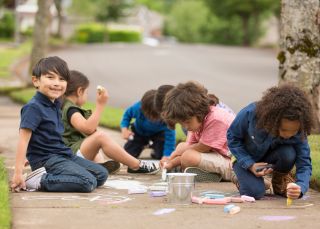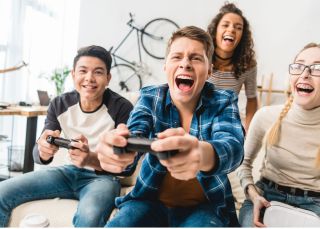A few evenings ago, I had the pleasure of moderating a talk by Dr. Peter Gray, a veteran researcher and professor of psychology at Boston College. His specialty is the intersectionality of child development, play, and education. His message clearly speaks to today’s parents, as rates of anxiety, depression, and suicidality have increased significantly and steadily among children and adolescents over the past 50 to 60 years. A converse trend in the lives of children has been a marked decrease in free play, or what we can think of for older children as self-directed independent activities.

Source: FatCamera/Getty Images Signature
Gray is a proponent of play because he and others believe that children learn essential skills through play that equip them for life and that are fundamental to their well-being. He believes that emotional coping, resilience, perseverance, confidence, and the courage for reasonable risk-taking, for example, are not skills and qualities that can be taught through lectures or didactic instruction. Instead, they are learned through the kinds of unscripted experiences often with others that involve problem-solving, social navigation, and compromise.
Play can be conceptualized as a self-paced opportunity for exploring and growing competencies in a variety of areas with little to no judgment. What better place to take risks than in an environment where there is relatively less judgment than in a structured, adult-directed context? That is not to say that young people don’t judge each other, but the kind of judgment experienced among peers is less absolute because they can determine how much or how little they want to listen to each other’s feedback, and there is no formal set of expectations to live up to. Free play gives children opportunities to be inventive and create rules that they can modify based on their performance, capability, and willingness to stretch themselves.

benefits of play
Source: FatCamera/Getty Images Signature
Opportunities for Independent Activities
Over the years, Gray and others have observed that children have fewer and fewer opportunities for independent activities that are not directed by adults. Instead of playing by themselves or among their peers without adult supervision, children frequently participate in structured activities where there is less opportunity for disagreement and for competing goals that must be resolved with compromise. Instead, adults intervene, and the children are told what to do. Structured activities like these also allow for less risk-taking, which means fewer opportunities to develop qualities like courage, self-confidence, and persistence that result in improved skills and competency.
Gray cites research indicating that an internal locus of control or agency over one’s life can serve as a protective factor from anxiety and depression. Locus of control can be thought of as the place of one’s determination: whether we feel we have control over outcomes in our lives, or whether we feel controlled by external forces. Children who believe their efforts will result in meaningful change in their environments and their lives are said to have an internal locus of control. By contrast, children who believe they are powerless to effect change in their environments and lives have an external locus of control, and these kids are often left feeling helpless and hopeless. Who wants to imagine that they are without any power to determine the course of their lives?

Source: Yuri Arcurs/Canva for Education
Encouraging Unstructured Play
The prescription to remedy the unhealthy outcomes we are increasingly witnessing is to encourage unstructured play and activities from which children can learn the myriad life skills mentioned earlier. For younger children, this play can look like the play of their parents’ childhoods—riding bikes in the neighborhood or park, being in the playground with adults who are nearby but not intervening. For older children, especially those living in urban neighborhoods where there may be fewer outdoor areas in which to gather, it may mean connecting with peers via social media. There are a number of disadvantages to electronic text-based interactions, however. They don’t allow for nuances of facial expression that help kids learn to read social cues, and distance creates an illusion of anonymity. Also, the immediacy of communication via text lacks the vocal cues and natural delay many of us need to reflect on the likely impact and consequences of our actions. The shortness of interactions via text can come across as impulsive or insensitive at times. Social responses about complex emotionally impactful topics are usually best tackled in real-time, whether in person or on the phone, so that we can gauge the impact of our words and revise them more immediately and accordingly.

Source: Syda Productions/Getty Images Signature
What can you do to provide your children with more of the kinds of learning opportunities needed to create their own agency? First, start with your own anxiety about allowing your child the freedom to be more autonomous and to engage in activities without your or another adult’s direct oversight. What is the worst thing that could come from their freedom? Is it highly unlikely? What parameters will minimize this possibility? Find parents who might be similarly interested in supporting free play. Can you rotate supervision with enough distance that you both allow for the autonomy of free play, while ensuring the safety you might worry about? Put it in place and let your child explore.
Children are watching the adults around them constantly. Model the joy you get from engaging in something you love. Share how that passion evolved over time — how initially you may not have been good at this past time. Share how this activity may enable you to experience flow —the feeling one gets when completely absorbed in a challenging but doable task (for example, golf, playing chess, painting, or playing an instrument). This activity may also bring you a sense of calm, of escape, of creativity, of un-judged productivity. Your children will not know what they like if they never try different things. They will not know what the experience of discovery is like if they never get the opportunity to discover.

Source: Lightfield Studios/Canva for Education
